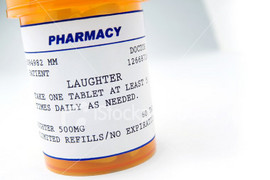Medicine
Is Laughter the Best Medicine?

We spend millions of dollars on prescription drugs every year, overlooking the natural healing apparatus we are born with.
For the most part, our bodies are designed to heal themselves. Laughter is one of the most important, natural coping mechanisms for the troubles of everyday life. Many think laughter is just a distraction from pain and sorrow, while others believe laughter can do much more than that.
Norman Cousins was an American professor, author, political journalist, and world peace supporter. One day, Norman came home from a meeting in Moscow when he felt severe joint pain and fever. He was diagnosed with ankylosing spondylitis, probably caused by exposure to heavy-metal poisoning. Cousins read a theory that said how negative emotions were harmful to the body. He then hypothesized that if negative emotions were harmful for your health, positive emotions should be able to improve your health. Still sick, Cousins was using high doses of painkillers, which he realized were damaging his body. As a result, he hired a nurse to read him funny stories and play Marx Brothers (comedy) movies for him. Soon enough, Norman was off the painkillers and sleeping pills. He found that the laughter relieved much of the pain and helped him sleep at night.
Because Norman Cousins "laughed himself out of" a deadly disease, scientists came up with the theory that laughter has the ability to strengthen the human immune system.
Humor vs. Stress

Laughter causes serotonin, a chemical that makes us happy, to be released in our brains. It reduces at least four hormones related to stress: adrenaline, dopamine, cortisol, and growth hormones. More than 70% of illnesses have some kind of relation to stress (High blood pressure, heart disease, depression, insomnia, migraine, anxiety, allergies, ulcers, etc.). The treatment of these mind-related diseases is made easier through the use of laughter, which aids in relaxation and is the easiest form of meditation. Some hospitals even have their own humor rooms, comedy carts, and clown kids to speed a patient's recovery and to boost morale. Laughing also helps cardiac patients by giving their hearts a good workout.
Laughter's Effects on the Body
Laughter relaxes your entire body; a strong, enthusiastic laugh relieves physical tension and stress, leaving your muscles relaxed for up to 45 minutes. Laughter also boosts the immune system. While decreasing stress hormones, it increases the number of natural killer t-cells, lymphocytes (white blood cells), and disease-fighting antibodies, which then improves the body's resistance to bacteria and viruses. These antibodies include IgA (immunoglobulin A), which fights against respiratory tract infections, and IgB (immunoglobulin B), which defends against infectious bacteria entering through the respiratory tract. Researchers have found that antibodies in the mucous membrane of the nose and in the body's respiratory system will also increase after a fit of laughter. As a result, frequency of colds, sore throats, and chest infections decrease.In addition to strengthening the immune system, laughter also triggers the release of endorphins, or the body's natural feel-good chemicals. Endorphins cause an overall feeling of well-being and happiness, and can even help relieve pain temporarily. It helps reduce the severity of pain from illnesses such as arthritis, migraine, and spondylitis (inflammation of the spinal cord). Laughter protects the heart and helps to control blood pressure. By improving the function of blood vessels and increasing the blood flow, laughter can protect a person from heart attack and other cardiovascular ailments. Laughter is simply a good cardio workout, increasing heart activity and stimulating oxygen circulation. After the laughter subsides, the cardiovascular system goes into a state of relaxation. Asthmatics also benefit from laughter because it improves lung capacity and oxygen levels in the blood. A good, deep laugh clears mucus and helps ventilation throughout the lungs, which is good for people with respiratory disorders. Although it can't reverse the problem, laughter can, in fact, halt the progress of diseases caused by abnormal blood pressure. People suffering from heart disease will find that laughter improves both blood and oxygen supply to the heart muscles; it massages the internal abdominal walls of the heart.
Humor Leads to Beauty?

Laughing can make you look younger because it tones up the muscles of your face and leads to an increase of blood supply. This process nourishes the facial skin and allows it to have that special glow.




